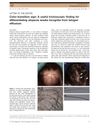 3 citations,
February 2008 in “Basic and clinical dermatology”
3 citations,
February 2008 in “Basic and clinical dermatology” Telogen Effluvium is a hair loss condition where treatment involves identifying and managing its triggers.
 3 citations,
April 1978 in “PubMed”
3 citations,
April 1978 in “PubMed” The study concludes that traction alopecia, caused by hair styling, can help understand telogen effluvium, a condition of excessive hair loss.
 2 citations,
July 2023 in “Life”
2 citations,
July 2023 in “Life” COVID-19 can cause temporary hair loss, which is commonly reversible with treatment.
 2 citations,
July 2023 in “Journal of Cosmetic Dermatology”
2 citations,
July 2023 in “Journal of Cosmetic Dermatology” The topical treatment reduced hair loss and improved hair growth in patients with certain types of hair loss.
 2 citations,
February 2023 in “Vaccines”
2 citations,
February 2023 in “Vaccines” Some people experienced hair loss after COVID-19 vaccination, but it's very rare and vaccines' benefits are greater than this risk.
 2 citations,
August 2022 in “Clinical Case Reports”
2 citations,
August 2022 in “Clinical Case Reports” A 17-year-old girl had severe, on-and-off hair loss, likely due to COVID-19. She was treated with Vitamin D3, biotin, and other supplements, and saw some improvement within a month.
 2 citations,
July 2022 in “Dermatology practical & conceptual”
2 citations,
July 2022 in “Dermatology practical & conceptual” Iron deficiency anemia may contribute to hair loss in women with Telogen effluvium.
 2 citations,
July 2022 in “Dermatologic Therapy”
2 citations,
July 2022 in “Dermatologic Therapy” Both botulinum toxin A and multivitamin mesotherapy effectively treat hair loss, with botulinum toxin A being the better single-session option.
 2 citations,
December 2021 in “Dermatology Online Journal”
2 citations,
December 2021 in “Dermatology Online Journal” COVID-19 has increased hair loss, but many patients see regrowth within months.
 2 citations,
July 2021 in “Dermatologic Therapy”
2 citations,
July 2021 in “Dermatologic Therapy” A woman's hair loss after COVID-19 was likely due to a mix of pressure-induced alopecia and acute telogen effluvium.
 2 citations,
September 2020 in “Dermatologic Surgery”
2 citations,
September 2020 in “Dermatologic Surgery” Hair transplant surgery can cause temporary hair loss in the area where hair was taken from.
 2 citations,
March 2020 in “PubMed”
2 citations,
March 2020 in “PubMed” Biotin deficiency is not a major cause of Telogen Effluvium hair loss.
 2 citations,
January 2019 in “International Journal of Medicine in Developing Countries”
2 citations,
January 2019 in “International Journal of Medicine in Developing Countries” Telogen Effluvium is a common hair loss condition, particularly in women, with no specific FDA-approved treatment, and recovery can take up to 18 months.
2 citations,
December 2018 in “Қазақстанның клиникалық медицинасы” Higher Vitamin-D levels may help treat certain types of hair loss.
 2 citations,
March 2018 in “The Journal of Dermatology”
2 citations,
March 2018 in “The Journal of Dermatology” The "color-transition sign" helps tell apart alopecia areata incognita from telogen effluvium by looking at hair color changes.
 2 citations,
July 2017 in “Skin appendage disorders”
2 citations,
July 2017 in “Skin appendage disorders” Alfredo Rebora suggests a simpler classification for hair loss and a new test for easier diagnosis.
2 citations,
January 2015 in “Journal of Health Science” Iron deficiency is more common in women with excessive hair loss.
 2 citations,
January 2014 in “Türkiye klinikleri tıp bilimleri dergisi”
2 citations,
January 2014 in “Türkiye klinikleri tıp bilimleri dergisi” Thyroid autoimmunity may be involved in some female hair loss, suggesting the need to test for thyroid antibodies in these patients.
 2 citations,
September 2012 in “Turk Dermatoloji Dergisi”
2 citations,
September 2012 in “Turk Dermatoloji Dergisi” Low levels of ferritin and vitamin B12 are common in women with telogen effluvium, but the link between nutrient deficiencies and the condition is not clear.
 2 citations,
January 2012 in “Hair therapy & transplantation”
2 citations,
January 2012 in “Hair therapy & transplantation” Low serum ferritin levels are not closely linked to telogen effluvium in women.
 2 citations,
August 2002 in “Zeitschrift für Hautkrankheiten”
2 citations,
August 2002 in “Zeitschrift für Hautkrankheiten” Telogen effluvium is a hair loss condition caused by various factors and requires a thorough examination to diagnose and differentiate from other hair loss types.
 2 citations,
February 1994 in “Archives of Dermatology”
2 citations,
February 1994 in “Archives of Dermatology” The debate focuses on the role of catagen and hair shedding mechanisms in telogen effluvium.
 2 citations,
November 1973 in “Archives of Dermatology”
2 citations,
November 1973 in “Archives of Dermatology” Hair loss might be an early sign of Hodgkin disease.
 1 citations,
April 2023 in “American Journal of Clinical Dermatology”
1 citations,
April 2023 in “American Journal of Clinical Dermatology” Chronic telogen effluvium may not be a unique condition and could be confused with other types of hair loss.
 1 citations,
December 2022 in “PubMed”
1 citations,
December 2022 in “PubMed” COVID-19 may cause temporary hair loss, which usually gets better on its own, but reducing stress and managing health issues might help recovery.
 1 citations,
October 2022 in “The Journal of Dermatology”
1 citations,
October 2022 in “The Journal of Dermatology” Hair loss occurred after a COVID-19 infection.
1 citations,
September 2022 in “Journal of the Egyptian Womenʼs Dermatologic Society” A rare scalp infection in a 66-year-old woman was successfully treated, leading to full hair regrowth.
1 citations,
August 2022 in “Frontiers in Medicine” ALRV5XR effectively promotes hair regrowth in both men and women through different mechanisms.
1 citations,
January 2022 in “Italian journal of dermatology and venereology” The combination of arginine and zinc reduces hair loss and increases hair growth effectively.
 1 citations,
January 2022 in “Skin appendage disorders”
1 citations,
January 2022 in “Skin appendage disorders” Hair shedding after childbirth can reveal a pre-existing condition of hair loss due to tight hairstyles.

























